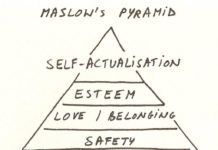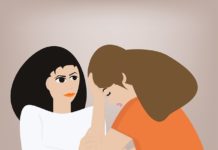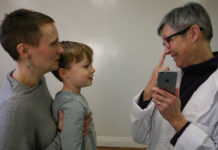The Virtual Couch: Is Online Therapy Going Viral?
From Alternet: Applications that provide online counseling, such as BetterHelp and Talkspace, are increasing in popularity. While some studies support the effectiveness of virtual therapy,...
Psychologist Debunks Common Misconceptions of Maslow’s Hierarchy
Utilizing Maslow’s published books and essays, psychologist William Compton delineates common myths and attempts to respond to them.
Brain Response to Antidepressant Mirrors Placebo Effect
People diagnosed with severe depression show the same changes in brain scans when they respond to a placebo as they do when they take an actual antidepressant, according to a new study. Researchers also found that those whose symptoms were decreased by a placebo were more likely to report relief from antidepressant drugs.
Training the Brain for Well-Being
Experience shapes the brain, for better or worse. Richard Davidson & Bruce McEwen review the ways that adverse early experience create measurable changes in...
Prescription Drug Addiction: Government Launches Investigation
From The Guardian: The British government has ordered an investigation into the growing problem of addiction to prescription drugs such as opioids, benzodiazepines, and antidepressants.
Article...
Group Mindfulness Shows Promise Reducing Depression Associated with Hearing Voices
A new study out of Kings College London found that twelve sessions of a group mindfulness-based therapy relieved distress associated with hearing voices while reducing depression over the long-term. The person-based cognitive therapy (PBCT) intervention had significant effects on depression, voice distress, voice controllability and overall recovery.
Critiques of a New Research Study on Antidepressants
A new meta-analysis claiming to prove once and for all that antidepressants are an effective treatment for moderate to severe depression was published just a few days...
Cognitive Behavioural Therapy Does Not Exist
Since the 1980s, a type of psychotherapy called Cognitive Behavioural Therapy (CBT) has become dominant. Like it or loathe it, CBT is now so ubiquitous it is often the only talking therapy available in both public and voluntary health settings. It is increasingly spoken about in the media and in living rooms across the country. Yet when we speak about CBT, what are we talking of? For CBT only exists - as we will see - as a political convenience.
“The Case for Publicly Funded Therapy”
-An article in Canada's Globe and Mail makes the case for expanding public funding of mental health services beyond psychiatrists.
The Elephant in the Room
From Discursive of Tunbridge Wells: Psychologist Rufus May speaks about the often overlooked role of racism in the mental health system. People of color are...
Therapeutic Alliance: Implications for Practice and Policy
In this piece for Psychiatric Services, Dr. Sandra Steingard comments on the implications of a recent meta-analysis demonstrating the positive effects of the therapeutic alliance on pharmacologic...
The Empire Dreamt Back: Britain’s Use of Psychoanalysis
From Aeon: In the early 20th-century Age of Empire, officials in the British Empire sought to better understand their colonial subjects through the use of...
Flexible Treatment Planning Improves Depression Outcomes in Youth
Researchers explore the effects of augmented treatment at various points in interpersonal psychotherapy for adolescents diagnosed with depression, highlighting previously unidentified critical decision points (i.e., relatively early in the treatment sequence).
Madness and the Family, Part III: Practical Methods for Transforming Troubled Family Systems
We are profoundly social beings living not as isolated individuals but as integral members of interdependent social systems—our nuclear family system, and the broader social systems of extended family, peers, our community and the broader society. Therefore, psychosis and other forms of human distress often deemed “mental illness” are best seen not so much as something intrinsically “wrong” or “diseased” within the particular individual who is most exhibiting that distress, but rather as systemic problems that are merely being channeled through this individual.
Review Reinforces Social Connection as Protective Health Factor
Is a lack of social connection in the US harmful to health? In a review of social connection and health literature, researcher calls for a societal shift in values towards interdependence.
Petition: Protect PTSD Treatments That Work!
The American Psychological Association recently issued a guideline recommending only short-term, structured, and symptom-focused therapies for the treatment of PTSD; the guideline may be...
Curing Schizophrenia via Intensive Psychotherapy
I believe that an Intensive Psychotherapy can lead to healing and, often, a cure of psychotic states. By cure I mean the cessation of delusions and hallucinations, and a gradual titration off of antipsychotic medication, with the cure lasting—even without continuing psychotherapy.
New Meta-Analysis: Mindfulness Interventions Effective for Psychiatric Disorders
A meta-analysis of mindfulness-based interventions shows efficacy for treating depression, physical pain, smoking, and addictive disorders.
Emotions: Keys to Our Freedom
Living in this very complex, demanding, stratified modern society has produced an epidemic of personal alienation. There is often a tragic gulf between our emotional experience and our awareness of it. 1 in 5 Americans are now taking a psychiatric medication. 1 in 4 women are now taking a psychiatric medication. All of those medications suppress, modify, or block emotion.
Like A Useless Drug Calling Psychotherapy Ineffective
-Does prominent Canadian child psychiatrist Stanley Kutcher have different standards for evidence depending on whether he's evaluating psychotherapy or psychotropics?
Brief Trauma-Focused Psychotherapies Effective for Children with PTSD
Eye Movement Desensitization and Reprocessing Therapy and Cognitive Behavioral Writing Therapy both reduce PTSD symptoms in children who experienced a single traumatic event.
Ioannidis Questions Strength of Psychology and Neuroscience Literature
Last week, well-known Stanford scientist John Ioannidis and his colleague Denes Szucs released a new analysis online. They examined research published in eighteen prominent...
Do We Really Need Mental Health Professionals?
Professionals across the Western world, from a range of disciplines, earn their livings by offering services to reduce the misery and suffering of the people who seek their help. Do these paid helpers represent a fundamental force for healing, facilitating the recovery journeys of people with mental health problems, or are they a substantial part of the problem by maintaining our modestly effective and often damaging system?
The Genetics of Schizophrenia: A Left Brain Theory about a Right Brain Deficit in...
In recent months, two teams of researchers in the UK and the US published complementary findings about the epigenetic origins of schizophrenia that have scientific communities who indulge in ‘genetic conspiracy theories’ abuzz. While these results are intriguing, and no doubt involve pathbreaking research methodologies, this line of thought represents a decontextualized understanding both of the symptoms that are typically associated with schizophrenia, and their causes.
Conflicts of Interest Found in Psychotherapy Research
Research highlights the need for conflict of interest transparency and management in systemic reviews of psychological therapies.
























